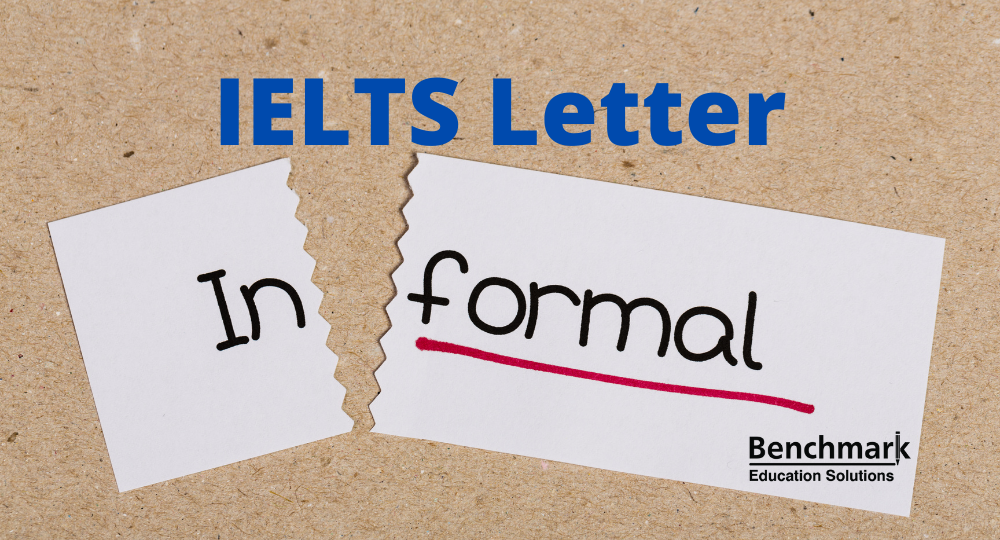Formal And Informal English Use In IELTS Writing Letter


In IELTS General Training (GT), you will be required to write a letter. One of the most important things that you should know about this is that you must choose the correct level of formality for it. In other words, you must decide whether it requires formal or informal language, and then correctly and consistently use that sort of language throughout the whole letter.
In this lesson, I will explain everything that you need to know, so read on if you plan on doing IELTS GT.
Formality in IELTS Writing: The Basics
If you are already quite familiar with IELTS writing, then you probably know that you mostly have to write in a very formal way. That is because people devote most of their time to studying task 2 and because most people seem to study for IELTS Academic, which features a type of essay for task 1 that also requires formal writing.
However, in IELTS GT, you will have to write a letter and, whilst that may sometimes involve formal writing, often it doesn’t. This is important to understand before you attempt to do the test. Thus, we need to consider two main things:
- How to determine whether you should use formal or informal writing.
- How to actually use formal and informal writing.
Let’s look at those ideas in the following sections.
Types of IELTS Letters and Required Formality
As you probably know, there are different types of IELTS writing letters you could need to write in the IELTS test. Sometimes you have to write to a restaurant manager to complain about a meal. On other occasions, you must write to a friend to ask a favour. Sometimes you need to write to a family member to give them some news, or you might write to an employer, a politician, or a newspaper editor. In other words, there are many possibilities.
When composing your reply, you have to think about various things. Of course, given that this is an English test, you must respond in correct grammar and use appropriate vocabulary. However, you also need to think about letter conventions, structure, and presenting a realistic idea within the letter – ie don’t go completely over the top in terms of creativity.
But of course there is also the idea of formality to consider. Would you write to a prospective employer with the same language that you would write to your best friend? No, of course not! These would contain totally different language in the same way that they would contain totally different ideas.
This is true of most languages, and even though English does not have a particularly complicated system of honorifics like Japanese or Korean, it does have some important differences, which we will look at in the next section. We need to employ these according to the person to whom we are writing.
You would probably use formal language when dealing with someone that you don’t know, particularly if they are in a position of power or otherwise require respect. You would use this for managers, politicians, landlords, business owners, and so on. On the other hand, you would most likely use informal language when dealing with people you know well, such as friends, family, co-workers, and flatmates.
Sometimes you have to think a little more carefully. Would a colleague require formal or informal language? What about a manager that you know well? How about a distant relative? As long as you are clear and consistent, you have a little freedom in these examples, and you can sometimes even use what we call “semi-formal” language, which is a blend of features from formal and informal language.
What are Formal and Informal Language, and How do I Use Them?
Now that we know when to use formal and informal language for IELTS writing, it is worth looking at what those entail. Perhaps we should start with informal first because it is a little easier to define.
Basically, informal language is the sort of language we use casually in an everyday setting with people that we know. It is usually spoken, but may be written, particularly on social media or in text messages. It foregoes many of the conventions of traditional, formal language and could include:
- Slang
- Idioms
- Contractions
- Abbreviations
- Omissions
There are also cases where we might break the rules of grammar slightly or switch out formal vocabulary for informal vocabulary. For example, we often use “get” and “got” in informal language, but those can always be traded for a better word in formal writing.
Formal writing, however, is grammatically correct and lexically accurate. We aim to use traditional structures and phrases, and often we are polite and deferential in tone. There are often features like the passive voice, participle clauses, and a more careful use of modals to express accurate and delicate meanings.
Here are some examples of formal and informal language:
| Formal | Informal |
|---|---|
| I am writing to request that… | I’m writing to ask you… |
| Since last week, I have been experiencing problems with… | I’ve had problems with… since last week. |
| I wonder if it would be possible for you to…? | Could you…? |
| It seems as though you ought to… | You should… |
| Entering the shop, I immediately noticed that… | I noticed… in your shop. |
These are just a few examples to show you how different formal and informal language can be, but there are many more cases like this. It can be difficult to learn all of this, but just keep in mind some of the basics:
- Informal language has more contractions and slang.
- Formal language has more transition phrases, polite words, and conventional grammar.
In terms of IELTS writing letters, of course, there are some differences. You need to open and close your letters in certain ways, and these will be quite different depending on who you write to. Formal letters will start with “Dear” and then usually address the person by a title or full name, or perhaps with “Sir or Madam”:
- Dear Dr Rogers
- Dear Mr Cuthbert
- Dear Mrs Susan Ryder
They will also end formally with your full name and also a sign-off that is quite formal, such as:
- Yours sincerely
- Yours faithfully
On the other hand, informal letters start more casually. They might say “Hi” or “Hello,” and will typically use the person’s first name because you already know them well:
- Hello Frank
- Hi Jane
- Hey Darren
You will usually sign off from these letters with “Best” or “Best regards,” but you might say “Thanks” or “Cheers” or “Bye” if it is very informal. We also often add a friendly line before the sign-off and this often breaks a grammatical rule by omitting the subject:
- Can’t wait to see you!
- Looking forward to your party.
- Hope to see you next week.
In each of these cases, we should have said “I…” at the start, but in informal writing, we can sometimes omit this, particularly for this last line of the letter.
That is one final thing worth considering: Not all letters can be neatly divided into either formal or informal. There are very formal letters, quite formal letters, semi-formal letters, fairly informal letters, and very informal letters. You have to tailor your language accordingly. Candidates aiming for a band 9 should be able to do this with some precision, but for band 7 you would really just need to know whether to use formal or informal words. The greater your knowledge here, the higher your score will be.
Conclusion
For IELTS writing task 1 in the general training test, you need to be able to use both formal and informal language. This requires being able to assess what the letter prompt requires of you and then stay consistent throughout the whole letter. Try to follow the above guidance and tailor your answer to the precise details of the prompt as well as your imagination, which you will be required to use to some extent. If you can do all of this, you will be on your way to a great score.











